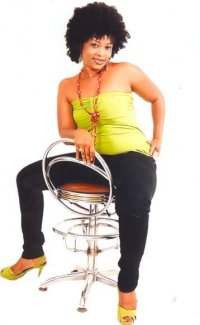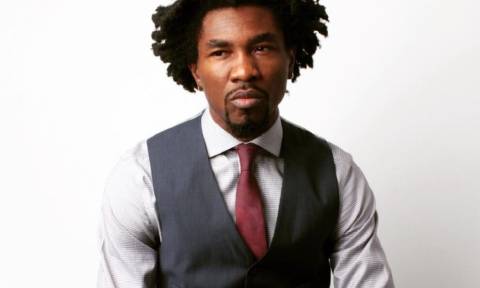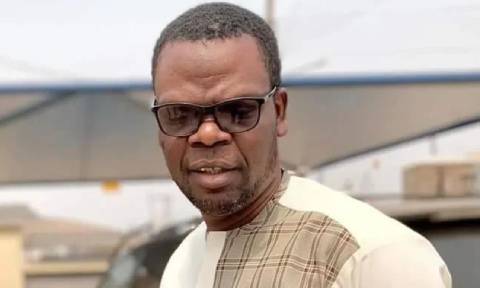
Her television programme, Inside Out, puts her in your face every week. Those who are familiar with the programme could testify to the fact that Agatha Amata says it the way she sees it. The mother of two, who‘s blunt and outspoken, bares it all to SAMUEL AWOYINFA
She knew very early in life that her passion was to be in the communication world, where she could reach so many people at the same time, through the power of the broadcast medium. But was it parental preference or was it fate that moved her into the world of science, as she toyed with zoology, chemistry before she eventually settled for botany in the university?
”In those days, parents preferred their children being doctors and all that,” she begins. ”But I was taken to study zoology. In my first year, they gave me a rat to dissect, I did not touch the rat, I am always scared of animals. But I drew it, because I was familiar with the internal organs of a rat. I had crammed the diagram from the text book. So, the lecturer called and said ‘your rat is still whole but there is fine diagram here, how did you do it?‘ Then, he said I had to dissect it. I ended up with low mark, because I failed to dissect that rat.”
With that she says she had to leave zoology. Some few months later she crossed over to chemistry department. Again she had to move. ”That course requires a lot of calculations and I discovered that I did more of calculations. It was not that easy, I had to work doubly hard to pass. I could pass well If I really put myself into it, but I concluded that why do I want to punish myself.
“That was how I ended up with botany. The plants were beautiful. They did not give me any stress. I could draw and label them. They don‘t talk back to me, they don‘t run around.
“I believe that if I had pursued a course of study in the arts I would have passed with ease, because that would have been a lot more natural to me.”
Talking about her childhood dream, the first crop female newscasters on Nigerian Television Authority, such as Bimbo Roberts (now Bimbo Oloyede), Sienne Allwell- Brown, Ruth Benemesia (now Ruth Opia), Ronke Darlene caught her fancy. And in the closet of her parents home, she rehearsed what she saw her role models do on TV.
She recollects, “I had always admired female newscasters of old such as Bimbo Roberts, Sienne Allwell-Brown, Ronke Darlene and a host of others. While growing up, I was interested in English language. If I see any book, any newspaper, I would grab it and start to read.
“Then, I would pretend to be in front of a television camera, and I would read it as if I was casting news. Those were the role models for me then. But these days, things are different. It is the footballers and musicians, many of our youth want to be like.”
And this brings us to the issue of failure of leadership and what the youth crave to cross from the level of obscene poverty to glittering world of glamour and prosperity. But Amata offers a more profound solution to youth unemployment in the country.
Though she notes that the youths in this country have not been well treated, she states that it’s not enough reason to give up.
She stresses, “I always tell young people, even if everybody fails you, don‘t fail yourself, because at the end of the day, there is only you. The economic situation might not be favourable, Nigeria is a land of opportunities.
“To see those opportunities, for some people it comes so easy, and for some it does not. But you have to be prepared and focused to reach these opportunities.
“Nigeria is a place where you can go to bed broke and wake up a millionaire. It is possible. We have the population, over 150 million people. This means if you can do something and target just one million people at one naira each, you are millionaire if that thing succeeds.”
She submits that where Nigerians are complaining of harsh economic environment, a lot of expatriates are coming into the country. According to her, perhaps they have discovered what we are yet to discover.
“We have the population to drive business. You can make money in this country if you think of what you can do,” she enthuses.
I would like to see in my lifetime a Nigeria where people do things right, where we have a leadership that actually cares about the people. I would like to be a part of bringing about that change in any way, manner or form. I would like to see a Nigeria where young people are not disillusioned.
I did a special package on Nigeria at 50, and while some panelists were reeling out what Nigeria used to be in their own time, some of the youths were astounded. They told stories that got the audience shocked. They told us stories of when they were in the universities; they gave them bed sheets, pillow cases, tissue papers, bursary among others. Those who are in the universities currently were astounded. I believe, Nigeria has the money to do all this.
For the graduate of the University of Jos, whose father was a tax officer and mother a retired air force officer, her programme, Inside Out, has given her a different outlook on life, because of different heart-rendering stories she had been inundated with and many of which she had treated, bringing experts/panelists to throw light on them.
“The programme has given me an opportunity not only to learn, because it‘s been a sort of school of life for me. When I listen to some of the stories people come here to tell me, it makes me see that I am still privileged more than some people. And that makes me want to help wherever I can.
“As far as I’m concerned now, what matters to me is the number of lives that I am able to impact positively.”
How has the experience been as a television personality and a content provider? She says her programme has clocked 14 years despite the daunting challenges of packaging a programme on television in this part of the world.
She adds that it has been very challenging because; she‘s operating in an environment where nothing is available. ”There is no power supply. As we are talking now, the generating set is running. Power is not a consideration in other climes.
“Whatever you want to do, power generation is one of the factors that must be considered. The other thing is that, currently, there are few companies placing advertisements in television programmes,” she says. She explains that it is the banks and the telecommunication companies that are still churning out different advertisements.
Still reeling out the challenges she argues further, ”The few manufacturing companies we have, are not doing advertisements. We have the people, we have the population to be able to drive the manufacturing sector but there are lots of other things that are not in place.
“So, when you have a programme on television you don‘t have a lot of companies coming to place their adverts in it, like what obtains in developed countries. So many of us are pursuing the very few companies that exist, to me, I would say having a programme on television is quite expensive.
“In other climes, they pay you for the content you are bringing to a TV station but here, it is the opposite.”
Agatha who was 41 years on Thursday, does not shy away from talking about the frosty relationship between her and father of her two kids, Fred Amata.
“I know you will ask the question. It is over four years now, but we still talk, he calls me and we gist. Forever, we are linked, because the children are there,” she says as she picks a candy from her desk and pops it into her mouth.



















